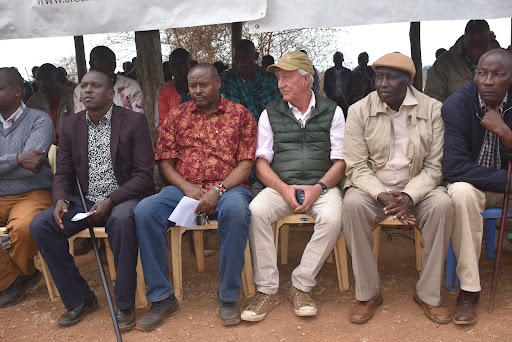
The Big Life Foundation on Monday launched a work-for-food program for 800 women to mitigate the adverse effects of drought in Kajiado.
Some 800 women from four group ranches in Rombo, Eselenkei, Imbirrikani, and Kimana will work ten days a month for 5 months and earn food.
The 800, according to BLF executive chairman Richard Bonham, represent families across the four group ranches that have more than 100,000 members.
A consultant with BLF, Joel Leshao, said the women will work under the supervision of clerks of work, who have been recruited by the foundation.
“Their duties include cooking in schools, removal of weeds in designated farmlands, tackling soil erosion issues, and planting of trees in health centres and schools,” said Leshao.
Leshao added some of the women will be assigned duties of cleaning urban centres and health centres in the four group ranches.
Bonham said the idea was muted when one of the women approached him and asked for food.
“She came to my office hungry and explained that the drought has devastated her family and that with nothing to eat, they would die. It touched my heart so much,” said Bonham.
From that time, Bonham formed a drought mitigation steering committee composed of the local leaders and went ahead to look for donors.
Bonham said he approached the Aquila Foundation in the US, which responded positively. He later contacted the Great Plains Foundation and UMRA Slaughter House.

Speaking during the launch of the program, former Kajiado deputy governor Paul Ntiati thanked all the organisations involved, adding that the region is devastated by the drought after it missed the April long rains.
“Families who are dependant on livestock for food have been left with nothing because the cows that produce milk have been driven too far areas of Mosiro, Kyulu Hills, and Iloodokilani,” said Ntiati.
The four organisations, last week, launched a five-month school feeding program in early childhood centres, primary and secondary schools in the four group ranches in Kajiado South.
The total number of those who will benefit from this program that started on Monday is 22,000 students in 27 schools.
Speaking separately, Moses Sunte, a resident of Imbirrikani said many families have been hit by the negative effects of drought such that livestock and wildlife have started dying.
“The goats and sheep at home are emaciated and cannot reach the markets for sale. Due to their condition, they cannot fetch good money for food in this economic situation,” said Sunte.
He said the Imbirrikani group ranch has no rivers and depending on irrigation using the Nol-Turesh piped water from Mt Kilimanjaro can be costly.
“The cost of living is too high for a pastoralist who has no grass for his livestock. Our children and wives wake up in the morning and look up to us to provide food. I have no work. The situation is really bad,” said Sunte.

 © The Star 2024. All rights reserved
© The Star 2024. All rights reserved